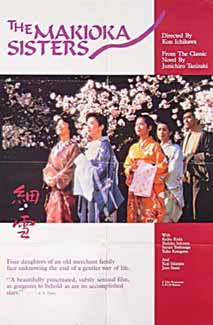The setting is the wartime precipice of 1938; the synthesizer score is distinctly 1983. When he finally adapted Junichiro Tanizakis novel The Makioka Sisters, Kon Ichikawa was 68 years olda living link to Japans cinematic Golden Age, taking on a self-consciously throwback prestige production. His film details the interlocked emotional lives of four Osakan siblings, orphaned young and left as caretakers of the once-prestigious Makioka name. Observing each woman meeting this duty, The Makioka Sisters is a Whartonian work of compassionate nostalgia tinctured with irony. Tsuruko and her husband are the family leadersbut the unmarried youngest sisters stay away from the old family seat, living instead with Sachiko and family. Familial code requires that marriages be arranged in strict chronological succession, so the youngest, Taeko, inclined toward bohemia and Western dress, impatiently waits on the decision of Yukiko, a paragon of classical pulchritude who has her own reasons for clinging to Sachikos house. The unspoken something between Yukiko and Sachikos husband is given almost entirely, unmistakably, in eyelines, typifying the films mapping out of relationships in quiet clarity, which is overwhelmed sporadically by onrushes of beautya rapturous collage of kimono fabric, or the sisters annual spring viewing of the cherry blossoms, figures at the center of an already-gone world. (Not rated. Call for showtimes.) NICK PINKERTON
Oct. 28-Nov. 3, 2011




